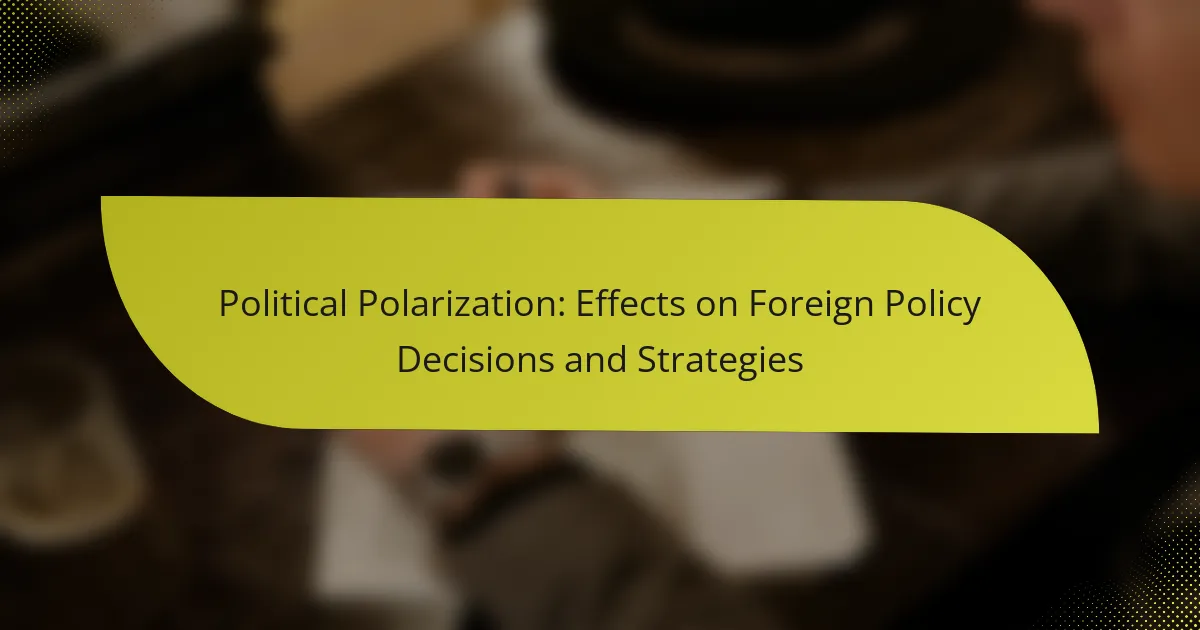Political polarization in the United States profoundly influences foreign policy decisions and strategies, resulting in a fragmented approach to international relations. This divide complicates diplomatic efforts and can lead to inconsistent policies that undermine the nation’s credibility and alliances on the global stage.
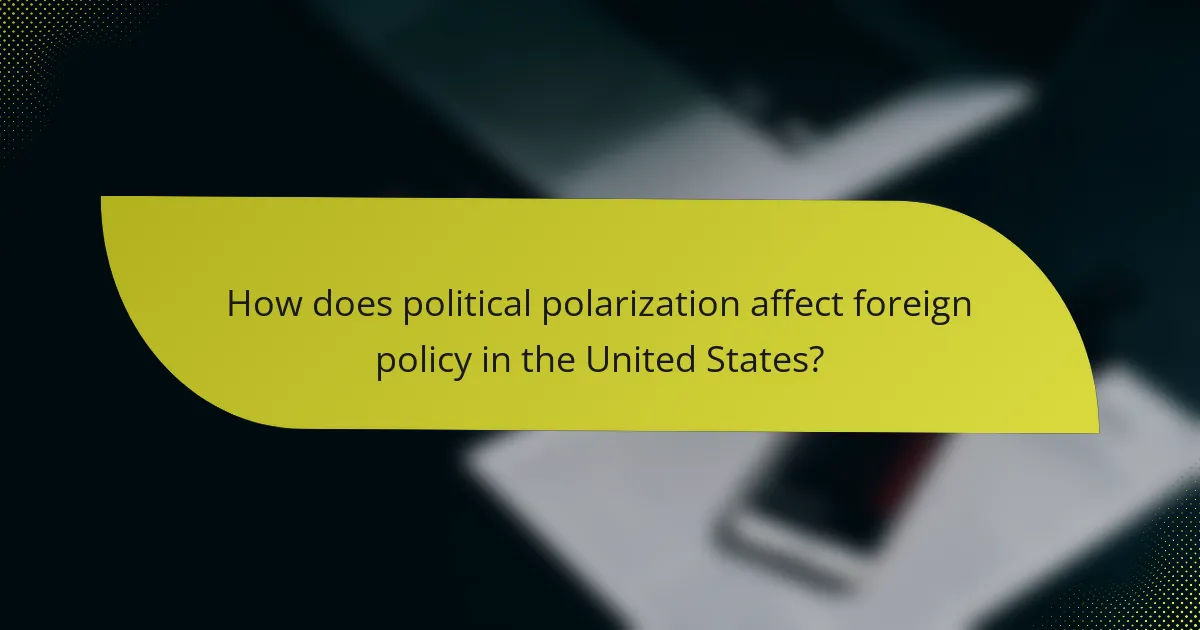
How does political polarization affect foreign policy in the United States?
Political polarization significantly impacts foreign policy in the United States by creating a divide in how decisions are made and which strategies are pursued. This division often leads to inconsistent policies that can undermine the country’s global standing and relationships.
Increased partisanship in decision-making
Increased partisanship leads to a scenario where foreign policy decisions are heavily influenced by party affiliation rather than national interest. This can result in a lack of bipartisan support for critical initiatives, making it challenging to implement long-term strategies.
For instance, a foreign policy initiative supported by one party may face outright opposition from the other, leading to policy reversals with each election cycle. This inconsistency can confuse allies and adversaries alike, complicating diplomatic relations.
Impact on international alliances
Political polarization can strain international alliances as partner countries may find it difficult to predict U.S. actions. Allies may hesitate to commit to joint initiatives if they fear that a change in administration could lead to a complete policy overhaul.
For example, NATO allies might question the U.S.’s commitment to collective defense if foreign policy shifts dramatically with each election. This uncertainty can weaken alliances and embolden adversaries who exploit these divisions.
Shifts in diplomatic strategies
Shifts in diplomatic strategies often occur as a result of political polarization, with administrations adopting vastly different approaches to international relations. One party may favor multilateral agreements, while the other may prioritize unilateral actions, leading to a fragmented global approach.
Such shifts can affect negotiations on critical issues like climate change or trade agreements, where consistency is vital for building trust. Countries may be less willing to engage in long-term partnerships if they perceive that U.S. policies could change drastically with a new administration.
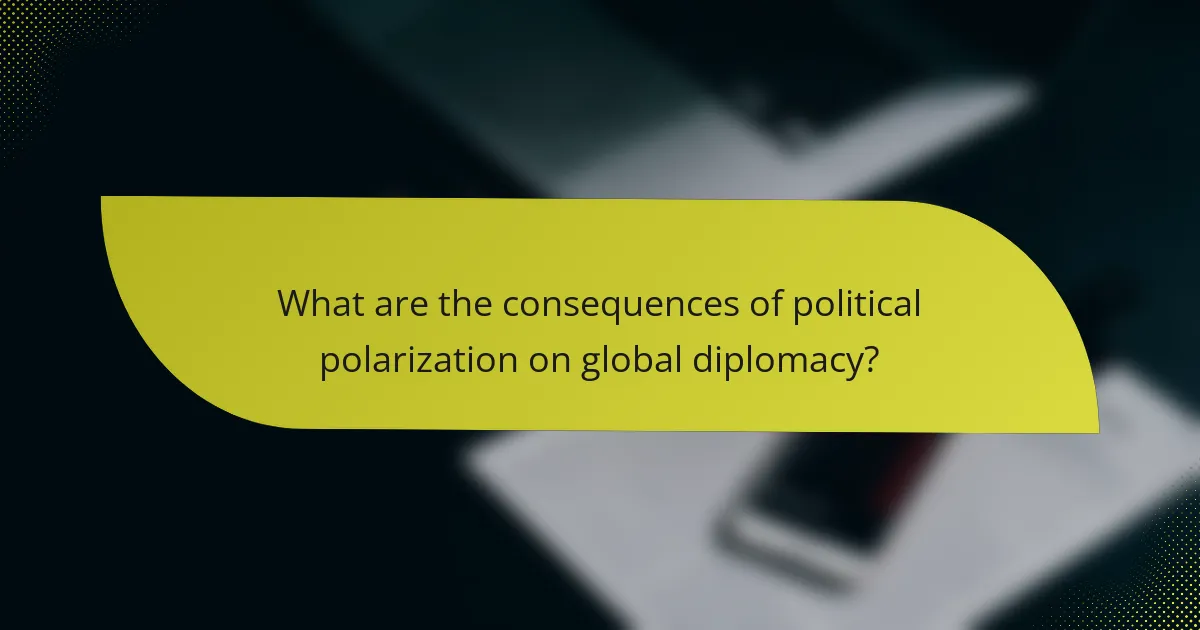
What are the consequences of political polarization on global diplomacy?
Political polarization significantly affects global diplomacy by creating divisions that complicate international relations and decision-making. As domestic political factions become more entrenched, the ability to engage collaboratively with other nations diminishes, leading to strained alliances and ineffective negotiations.
Strained relationships with allies
Political polarization can lead to distrust and tension among allied nations. When a country shifts its foreign policy based on internal political changes, allies may feel uncertain about their partnership, which can result in weakened coalitions and reduced cooperation on global issues.
For example, a change in leadership may lead to a reevaluation of commitments to international agreements, such as climate accords or military alliances, causing allies to question the reliability of their partner. This unpredictability can hinder collective action on pressing global challenges.
Challenges in multilateral negotiations
Multilateral negotiations often require consensus, which becomes difficult in a polarized political environment. Diverging domestic agendas can lead to conflicting priorities, making it hard to reach agreements that satisfy all parties involved.
In practice, this can result in stalled negotiations on critical issues like trade agreements or security pacts, as countries may prioritize their internal political battles over collaborative solutions. The inability to compromise can ultimately weaken the effectiveness of international institutions and agreements.
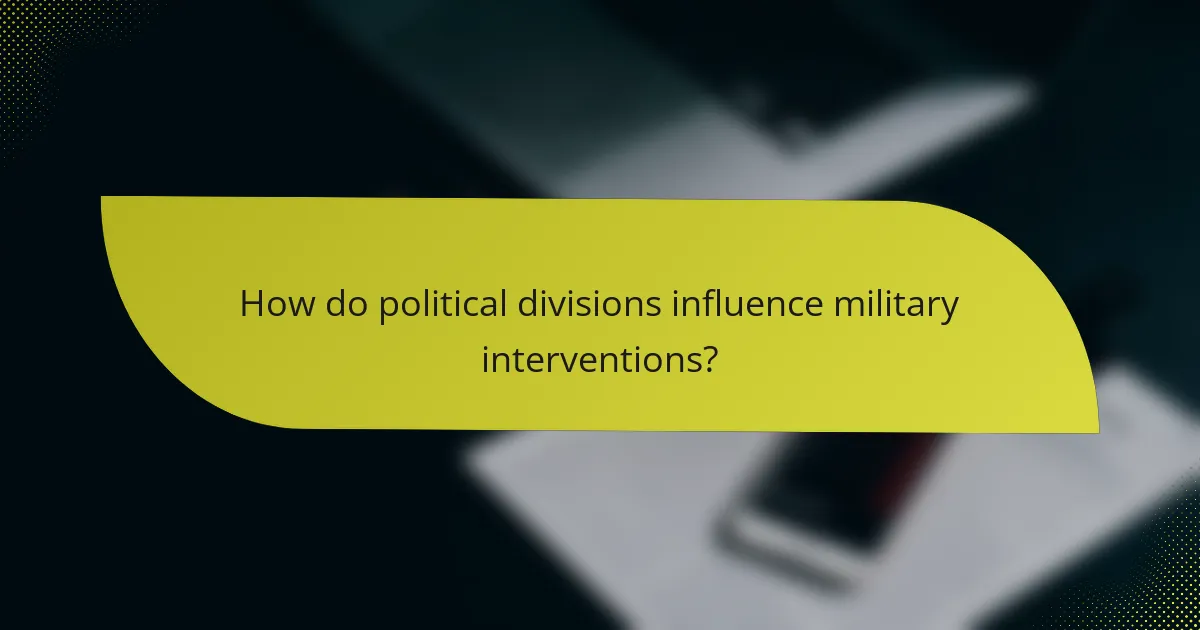
How do political divisions influence military interventions?
Political divisions significantly impact military interventions by shaping public opinion and legislative support. These divisions can lead to inconsistent foreign policy strategies, often swaying decisions based on partisan alignment rather than unified national interest.
Partisan support for military actions
Partisan support for military actions can vary greatly, affecting the likelihood of intervention. Generally, when the party in power aligns with military action, there tends to be stronger backing from its members, while opposition parties may resist or criticize such moves. For example, a Republican-led administration may receive more support for interventions in regions like the Middle East, while Democrats might focus on diplomatic solutions.
This division can create challenges in forming a cohesive foreign policy, as shifting political landscapes may lead to abrupt changes in military strategy. It is crucial for policymakers to gauge bipartisan support to ensure sustained commitment to military initiatives.
Variability in defense spending priorities
Political polarization also leads to variability in defense spending priorities, often reflecting the differing values of each party. For instance, one party may prioritize funding for advanced technology and cyber defense, while another might focus on traditional military capabilities and troop levels. This can result in fluctuating budgets that complicate long-term defense planning.
Moreover, changes in administration can lead to significant shifts in defense allocations, impacting readiness and operational capabilities. Stakeholders should monitor these trends closely, as they can influence the effectiveness of military interventions and overall national security strategy.
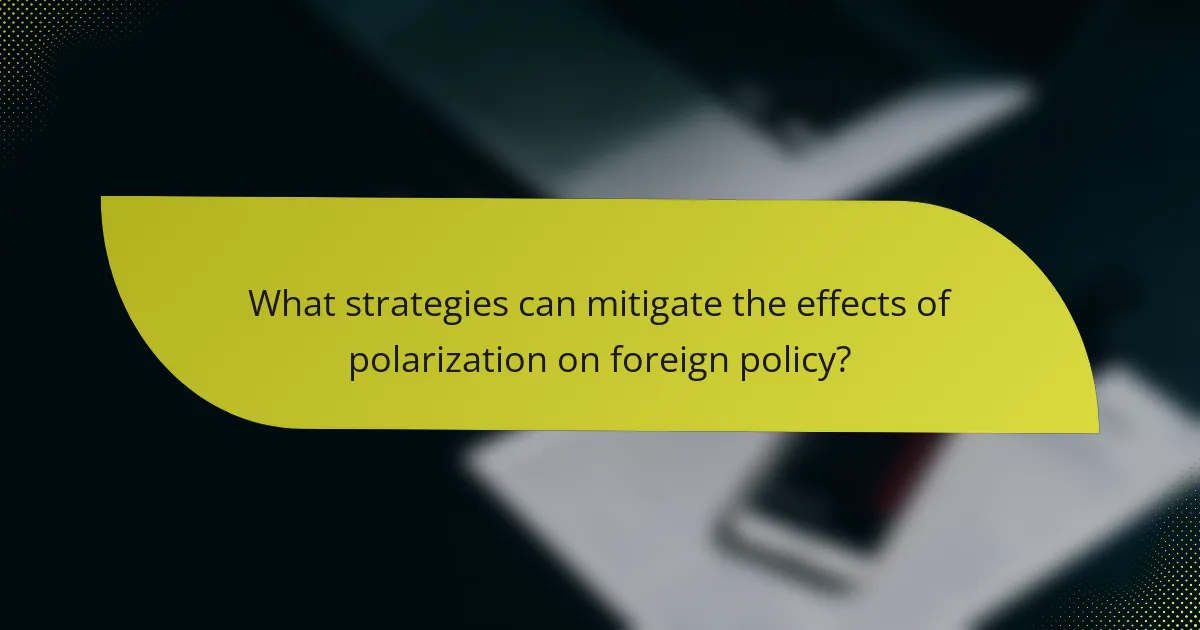
What strategies can mitigate the effects of polarization on foreign policy?
Mitigating the effects of polarization on foreign policy requires intentional strategies that foster cooperation and understanding among diverse political factions. Key approaches include promoting bipartisan dialogue and engaging with international stakeholders to create a more unified stance on global issues.
Promoting bipartisan dialogue
Encouraging bipartisan dialogue is essential for reducing polarization in foreign policy. This can be achieved through regular forums, workshops, and discussions that bring together representatives from different political parties to share perspectives and develop common goals.
Practical steps include organizing joint congressional hearings on foreign policy issues or creating bipartisan task forces that focus on specific challenges, such as climate change or international security. These initiatives can help build trust and foster collaborative problem-solving.
Engaging with international stakeholders
Engaging with international stakeholders is crucial for creating a cohesive foreign policy that transcends domestic divisions. This involves actively involving foreign governments, NGOs, and international organizations in discussions about global challenges and potential solutions.
For example, hosting international summits or participating in multilateral negotiations can provide platforms for dialogue that emphasize shared interests over partisan differences. Additionally, leveraging public diplomacy initiatives can help communicate a unified message abroad, enhancing the credibility of the nation’s foreign policy.
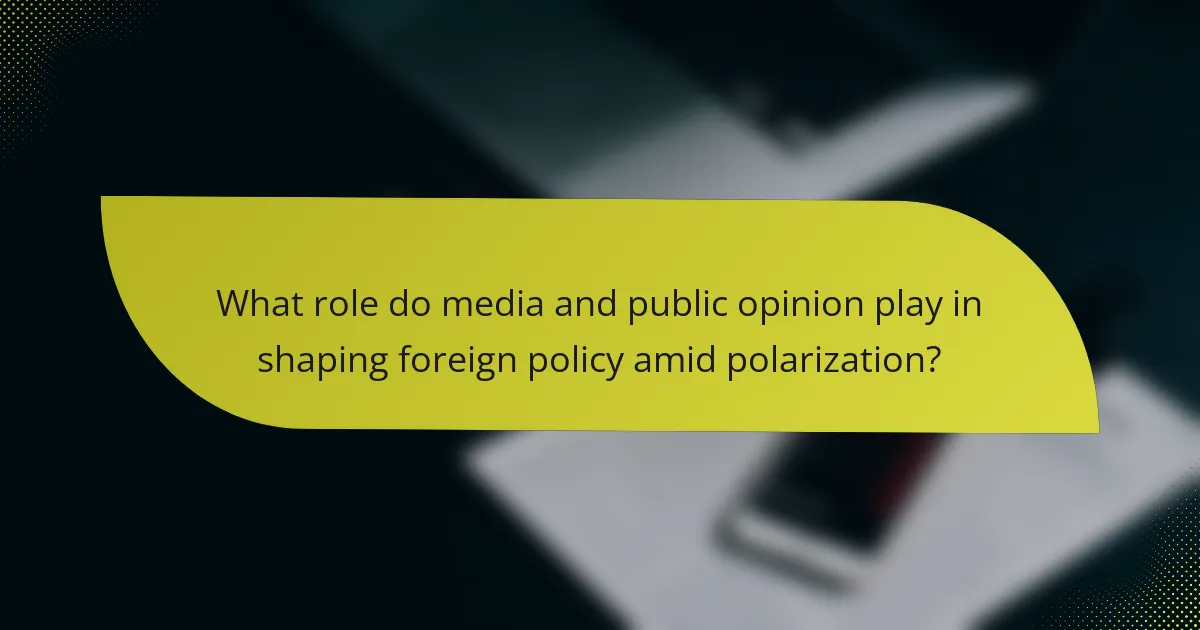
What role do media and public opinion play in shaping foreign policy amid polarization?
Media and public opinion significantly influence foreign policy decisions, especially in a polarized political environment. The way information is presented can sway public sentiment, which in turn pressures policymakers to align their strategies with prevailing views.
Influence of partisan media on perceptions
Partisan media outlets often frame international events in ways that resonate with their audience’s political beliefs, shaping perceptions of foreign policy issues. For example, a conservative outlet may emphasize national security threats, while a liberal source might focus on humanitarian concerns, leading to divergent public opinions on military interventions.
This framing can create echo chambers where individuals are less exposed to opposing viewpoints, reinforcing existing biases. As a result, policymakers may feel compelled to adopt stances that cater to their party’s media narrative, potentially compromising a balanced approach to foreign relations.
Public opinion shifts affecting policy decisions
Public opinion is a powerful force that can lead to rapid changes in foreign policy. When significant events occur, such as military conflicts or humanitarian crises, public sentiment can shift quickly, prompting leaders to adjust their strategies to maintain support. For instance, a sudden rise in anti-war sentiment can lead to calls for troop withdrawals or changes in diplomatic approaches.
Policymakers must navigate these shifts carefully, balancing their own party’s agenda with the electorate’s demands. Engaging in regular public consultations and utilizing opinion polls can help gauge sentiment and inform decisions, ensuring that foreign policy remains responsive to the populace while also considering long-term strategic interests.
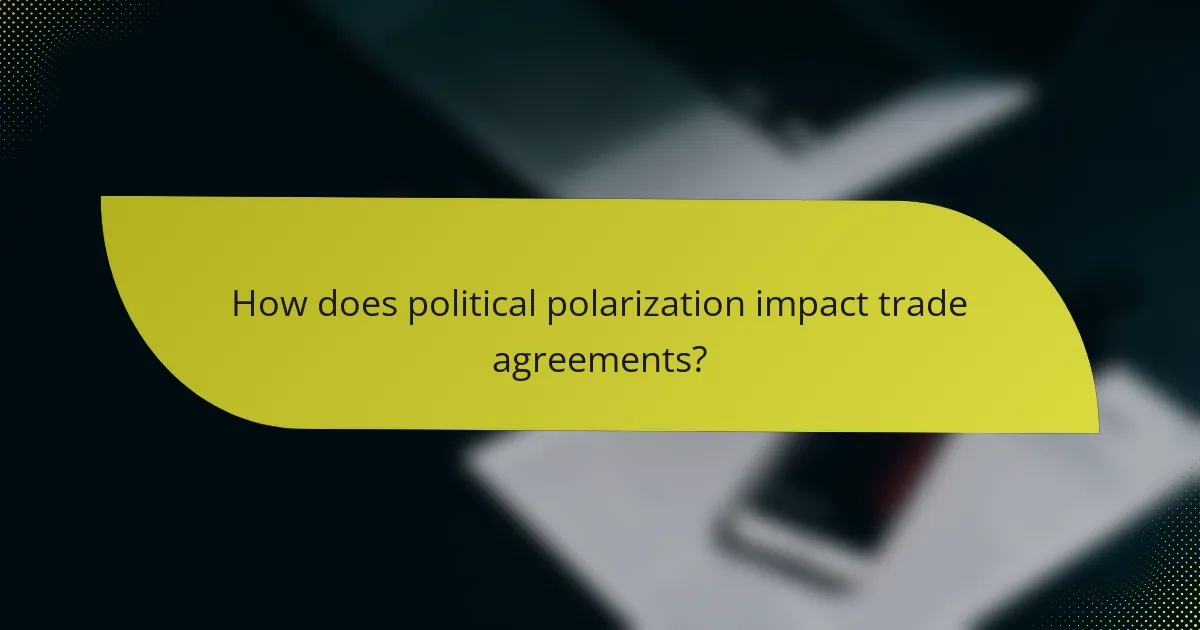
How does political polarization impact trade agreements?
Political polarization significantly affects trade agreements by creating divergent priorities and strategies among parties. This division can lead to inconsistent trade policies, complicating negotiations and implementation.
Changes in trade policy based on party lines
Trade policies often shift dramatically depending on the ruling party’s ideology. For instance, a more liberal administration may prioritize environmental standards and labor rights in trade agreements, while a conservative government might focus on deregulation and reducing tariffs. These shifts can create uncertainty for businesses engaged in international trade.
As a result, companies must stay informed about political trends to anticipate changes in trade agreements. Engaging with lobbyists or industry groups can provide insights into potential policy shifts based on the prevailing political climate.
Negotiation tactics influenced by political climate
The political climate shapes negotiation tactics, as parties may adopt more aggressive or conciliatory approaches based on their ideological stance. For example, a polarized environment may lead to hardline tactics, where negotiators push for maximum concessions, potentially straining relationships with trading partners.
Conversely, in a less polarized setting, negotiators might focus on building consensus and fostering collaboration. Understanding the current political landscape can help negotiators adapt their strategies effectively, ensuring that they remain flexible and responsive to changing dynamics.
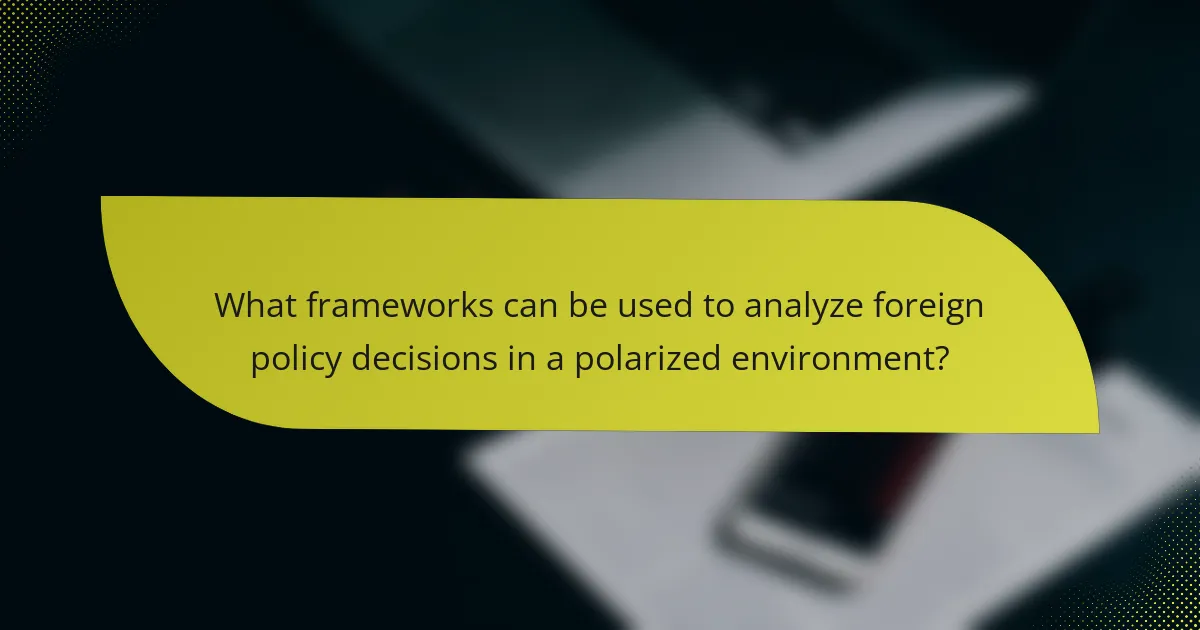
What frameworks can be used to analyze foreign policy decisions in a polarized environment?
In a polarized environment, frameworks that emphasize decision-making processes and historical comparisons are essential for understanding foreign policy decisions. These frameworks help identify how political divisions influence strategies and outcomes in international relations.
Decision-making models
Decision-making models provide structured approaches to analyze how foreign policy decisions are made, especially under political polarization. Key models include rational choice theory, which assumes that policymakers make decisions based on logical evaluation of options, and the garbage can model, which highlights the chaotic nature of decision-making in politically charged contexts.
In a polarized setting, decision-making can be influenced by party loyalty and ideological biases. For instance, a model might reveal that decisions are often swayed by the dominant party’s agenda, leading to a lack of bipartisan support for foreign initiatives. Understanding these dynamics can help predict potential outcomes and identify areas for compromise.
Comparative analysis of historical precedents
Comparative analysis of historical precedents allows policymakers to examine past foreign policy decisions and their outcomes in similar polarized environments. By studying cases like the Vietnam War or the Iraq invasion, analysts can identify patterns in decision-making that were influenced by political divisions.
This approach can highlight the risks and benefits of certain strategies, such as unilateral actions versus multilateral coalitions. For example, examining how past administrations navigated partisan divides can inform current leaders on effective negotiation tactics and the importance of building consensus to achieve foreign policy goals.
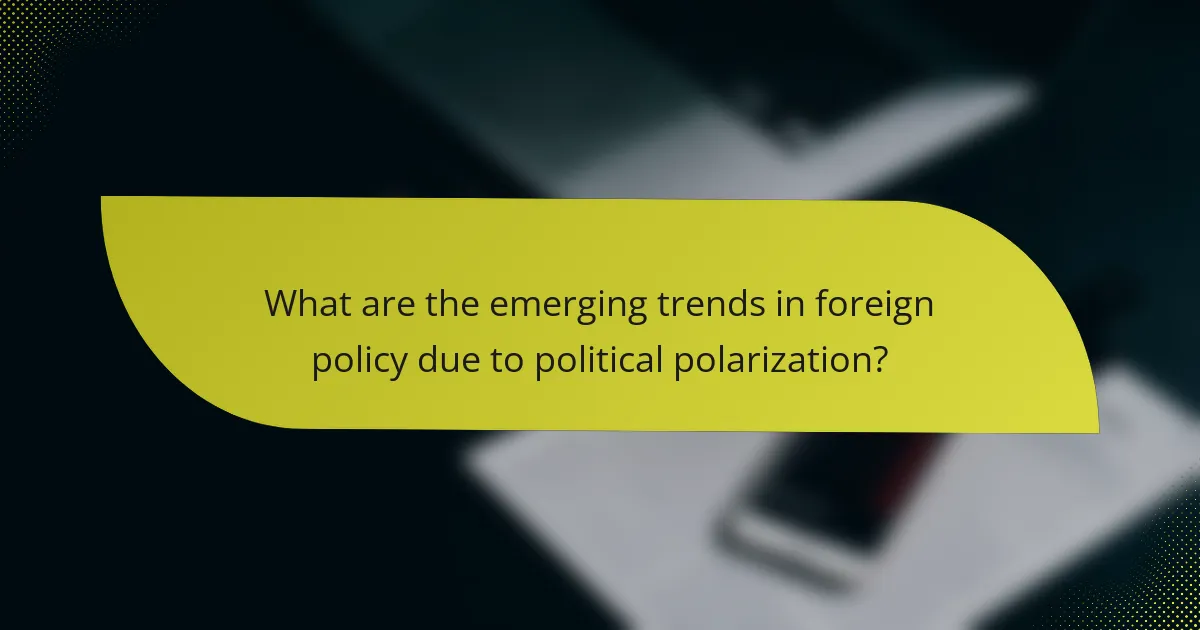
What are the emerging trends in foreign policy due to political polarization?
Political polarization is increasingly shaping foreign policy by creating divergent approaches between parties, leading to inconsistent strategies and priorities. This trend can result in reactive rather than proactive policies, affecting international relations and alliances.
Increased Partisanship in Foreign Policy Decisions
Partisanship in foreign policy has intensified, with decisions often reflecting the ideological stance of the ruling party rather than a unified national interest. This shift can lead to abrupt changes in policy when administrations change, undermining long-term strategies.
For example, trade agreements may be renegotiated or abandoned based on the prevailing political ideology, impacting economic relations with key partners. Such volatility can create uncertainty for businesses and allies alike.
Impact on International Alliances
Political polarization can strain international alliances as differing domestic priorities lead to conflicting foreign policy objectives. Countries may find it challenging to maintain consistent partnerships when leadership changes result in significant shifts in policy direction.
For instance, a nation that previously supported multilateral agreements may retreat to unilateral actions under a new administration, causing friction with allies who favor collaboration. This inconsistency can weaken collective security arrangements and diplomatic efforts.
Shifts in Public Opinion and Its Influence
Public opinion, often polarized itself, plays a crucial role in shaping foreign policy. Leaders may feel pressured to align their international strategies with the prevailing sentiments of their political base, which can lead to a focus on short-term gains over long-term stability.
Polling data may show stark differences in how various demographics view issues like military intervention or climate agreements, influencing policymakers to cater to these divisions. This responsiveness can result in policies that reflect populist sentiments rather than strategic necessities.
Challenges in Policy Continuity
Political polarization complicates the continuity of foreign policy, making it difficult to sustain long-term initiatives. Each new administration may prioritize its agenda, leading to a cycle of policy reversals that can hinder progress on critical global issues.
For example, climate change initiatives may be abandoned or altered significantly with each election cycle, impacting international commitments and negotiations. This lack of continuity can erode trust among nations and diminish the effectiveness of collaborative efforts.
